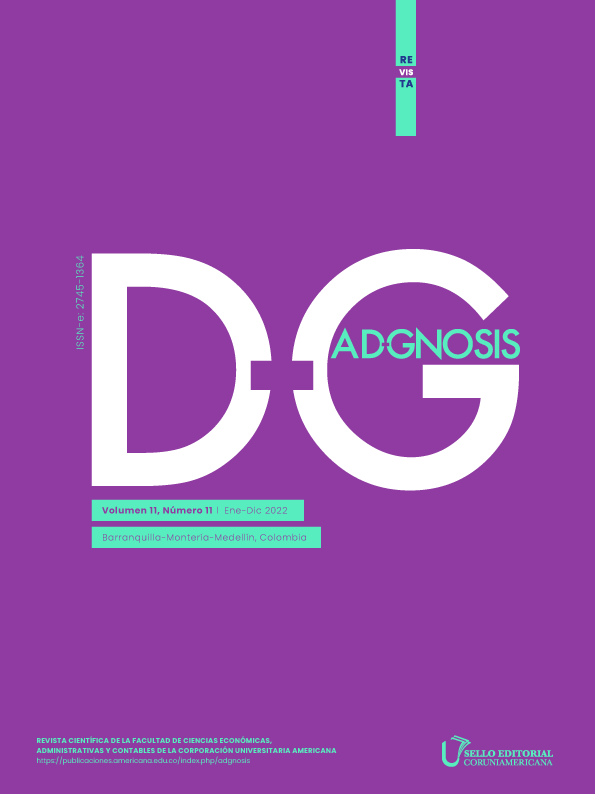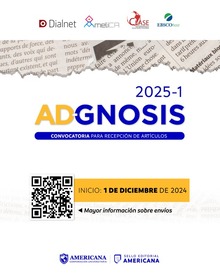Approach to digital transformation in a group of SME hotels in the Colombian Caribbean
DOI:
https://doi.org/10.21803/adgnosis.11.11.532Keywords:
Analysis of consumers, hotels, digital transformationAbstract
The objective of the research is to describe the capabilities for digital transformation of a group of MSME hotels in the Colombian Caribbean. The methodology corresponds to the mixed approach. An instrument was designed for
the two variables and was applied to a sample of forty (40) hotels in the cities of Barranquilla and Santa Marta; this questionnaire had forty-four (44) items for the digital transformation variable and thirty-four (34) for the digital consumer behavior variable. It was found that there is an absence of advanced digital knowledge, there is no access of employees to training plans in digitization and absence of cybersecurity measures, data analytics is done manually and there is an absence of customer loyalty programs such as CRM and finally there is a lack of knowledge of hotel managers in relation to digital technologies such as email marketing, LinkedIn, Google Ads, YouTube, Vimeo and others. It is concluded that the commercial management of hotels requires training processes and training of employees for the efficient management of digital technologies in order to contribute to the strategic relationship with the customer.
Downloads
References
Agarwal, R., Gao, G. G., DesRoches, C. y Jha, A. K. (2010). The digital transformation of healthcare: Current status and the road ahead. Information Systems Research, 21(4), 796–809.
Bacco, M.; Brunori,G; Ferrari,A.; Koltsida, P. y Toli, E. (2020). IoT as a Digital Game Changer in Rural Areas: the DESIRA Conceptual Approach. 2020 Global Internet of Things Summit (GIoTS), 1-6, doi: 10.1109/GIOTS49054.2020.9119674.
Bernal, C. (2010). Metodología de la investigación. Pearson.
Caliskan, A.; Ozkan, Y. y Ozturkoglu, Y. (2020). Digital transformation of traditional marketing business model in new industry era. Journal of Enterprise Information Management, 36 (4), 599–614.
Casadesus-Masanell, R. y Ricart, J. E. (2010). From strategy to business models and onto tactics. Long Range Planning, 43(2–3), 195–215.
Consejo Privado de Competitividad – CPC (2020). Informe Nacional de Competitividad 2019-2020. https://compite.com.co/wp-
content/uploads/2019/11/CPC_INC_2019-2020_Informe_final_subir.pdf
El Espectador (2020, 28 de marzo). La transformación digital: un reto para las empresas en Colombia. https://www.elespectador.com/mtalks/la-transformacion-digital-un-reto-para-las-empresas-en-colombia-articulo-911319/
Haskel, J. y Westlake, S. (2018). Capitalism without Capital: The Rise of the Intangible Economy. Princeton University Press.
Henriette, E.; Feki, M. y Boughzala, I. (2016). Digital Transformation Challenges (Mediterranean Conference on Information Systems - MCIS). https://aisel.aisnet.org/cgi/viewcontent.cgi?article=1033&context=mcis2016
Hernández, Fernández y Baptista (2010). Metodología de la investigación. McGraw-Hill.
Iansiti, M. y Lakhani, K. R. (2014). Digital ubiquity: How connections, sensors, and data are revolutionizing business. Harvard Business Review, 92(11), 90–99.
Innpulsa Colombia y MINTIC (2019). Modelo de madurez para la transformación digital.
Kane, G. C., Palmer, D., Phillips, A. N., Kiron, D. y Buckley, N. (2015). Strategy, Not Technology, Drives Digital Transformation. MIT Sloan Management Review and Deloitte University Press. https://www.cubility.com.au/wp-content/uploads/2018/11/dup_strategy-not-technology-drives-digital-transformation.pdf
Katz, R. y Suter, S. (2009). Estimating the economic impact of the broadband stimulus plan (working paper). Columbia Institute for Teleinformation.
Lam, C. y Law, R. (2019). Readiness of upscale and luxury-branded hotels for digital transformation. International Journal of Hospitality Management, 79, 60 –69.
Li, F., Nucciarelli, A., Roden, S. y Graham, G. (2016). How smart cities transform operations models: A new research agenda for operations management in the digital economy. Production Planning & Control, 27(6), 514–528.
Liu, D. Y., Chen, S. W. y Chou, T. C. (2011). Resource fit in digital transformation – Lessons learned from the CBC bank global e-banking project. Management Decision, 49(10), 1728–1742.
MinTIC – Innpulsa Colombia (2019). Modelo de madurez para la transformación digital. Autor.
Montenegro Rada, A., Uribe-Uran, A., Garizabal Donado, M. y Sánchez Otero, M. (2017). Negocios inclusivos beneficio compartido entre empresas y poblaciones vulneradas de Latinoamérica. Revista Espacios, 38 (59), 9-18. https://www.revistaespacios.com/a17v38n59/a17v38n59p09.pdf
Natu, J. y Kurniasari, F. (2019). Sustainable digital transformation in hospitality industry: study of the hotel industry in Indonesia. Advances in Economics, Business and Management Research, 100, 217-222.
Nozdreva, R. y Churakova, A. (2021). Digital Tools in Empirical Marketing Strategies of Global Hotel Companies. N. Konina (Ed.) Digital Strategies in a Global Market (pp. 213-227). Springer.
Orekhova, E.; Romashkin, T. y Ustinova, N. (2018). Synergetic Efficiency of the Economic System in the Conditions of Digital Economy Development: Conceptual Approach. Advances in Economics, Business and Management Research, 47, 191-194.
Organización para la Cooperación y el Desarrollo Económicos-OCDE (2019). Perfilando la Transformación Digital en América Latina. OCDE Publishing.
Pagani, M. y Pardo, C. (2017). The impact of digital technology on relationships in a business network. Industrial Marketing Management, 67, 185–192.
Portafolio (2020, 16 de diciembre). Seis de cada 10 empresas se transformaron digitalmente en la pandemia. https://www.portafolio.co/contenido-patrocinado/seis-de-cada-10-empresas-se-transformaron-digitalmente-en-la-pandemia-547583
Schwertner, K. (2017). Digital transformation of business. Trakia Journal of Sciences, 15 (1), 388-393.
Sebastian, I. M., Ross, J. W., Beath, C., Mocker, M., Moloney, K. G. y Fonstad, N. O. (2017). How big old companies navigate digital transformation. MIS Quarterly Executive, 16(3), 197–213.
Singh, A. y Hess, T. (2017). How chief digital officers promote the digital transformation of their companies. MIS Quarterly Executive, 16(1), 1–17.
Teece, D. J. (2010). Business models, business strategy and innovation. Long Range Planning, 43(2–3), 172–194.
Ugalde, B. N. y Balbastre-Benavent, F. (2013). Investigación cuantitativa e investigación cualitativa: buscando las ventajas de las diferentes metodologías de investigación. Revista de Ciencias económicas, 31(2), 179- 187. https://revistas.ucr.ac.cr/index.php/economicas/article/view/12730
Uribe-Urán, A. P. (2014). Percepción del enfoque gerencial y del modelo de acreditación por alta calidad aplicado en universidades colombianas. Cuadernos de administración, 30(51), 49–57. https://doi.org/10.25100/cdea.v30i51.42
Varkaris, E. y Neuhofer, B. (2017). The influence of social media on the consumers’ hotel decision journey. Journal of Hospitality and Tourism Technology, 8 (1), 1-29. http://dx.doi.org/10.1108/JHTT-09-2016-0058
Verevka, T. (2019). Development of Industry 4.0 in the Hotel and Restaurant Business. IBIMA Business Review, 2019, 1-12. DOI: 10.5171/2019.324071
Verhoef, P.; Broekhuizen, T.; Bart, Y.; Bhatacharya, A.; Qi, J.; Nicolai, F. y Haenlei, M. (2021). Digital transformation: A multidisciplinary reflection and research agenda. Journal of Business Research, 122, 889-901. https://doi.org/10.1016/j.jbusres.2019.09.022
Zott, C., y Amit, R. (2008). The fit between product market strategy and business model: Implications for firm performance. Strategic Management Journal, 29(1), 1–26.
Downloads
Published
Versions
- 2022-12-07 (3)
- 2022-09-07 (2)
Issue
Section
License
Copyright (c) 2022 AD-GNOSIS

This work is licensed under a Creative Commons Attribution-NonCommercial-NoDerivatives 4.0 International License.






